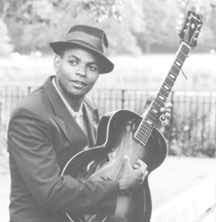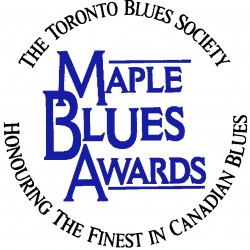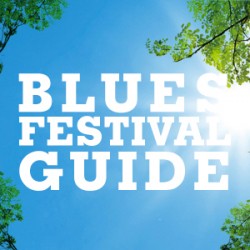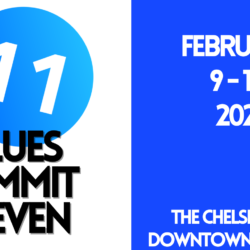Guy Davis
Guy Davis made his Toronto debut at a North by Northeast showcase last year and performed at Soul `n Blues later that summer. He returns to Harbourfront Centre on Sunday, February 4 for an afternoon set in the Water’s Edge Cafe at 2pm. February 3, he’ll be be doing an opening spot for It’s Comedy and Story Time with Kenny Robinson and the Nubian Disciples All Black All Star Comedy Revue as part of Kuumba, Harbourfront Centre’s salute to African Heritage Month.
How did you come to play the blues? That’s a question that takes on a special resonance when you’re asking one of the recently recorded young black singer/guitarists who have embraced the traditional acoustic guitar style that was born in the American south. That’s because until now, they have been few and far between, considering they carry the torch that was ignited by an earlier generation of young black singer/guitarists in the 20s and 30s, in particular, Robert Johnson.
Keb Mo and Guy Davis are the first two who come to mind. Keb because he’s getting the “big marketing push,” and Guy because he’s getting attention by giving his audiences much more than the classic “bluesman with guitar.” I’ve seen him actually startle an audience – not with a guitar riff, but with some dramatic reading from his one-man show In Bed with the Blues: The Adventures of Fishy Waters.
Keb Mo settled into the blues after a prolonged apprenticeship in jazz and Davis is a sophisticated Manhattan-born son of the celebrated actor/directors Ossie Davis and Ruby Dee. It’s not a typical bluesman, black or white, who gets to stand on the stage of the Gershwin Theatre and present his father the Lifetime Achievement Award of the Broadway Hall of Fame.
“When I first heard the blues and ragtime music I thought it was something invented by white college boys because that’s who I heard playing it. The music itself was powerful enough to make me love it regardless of who was playing it, but as I’ve grown up, I’ve come to understand that the blues is connected to people who had to suffer for a lot of that music that we hear now – there are black men who lived and died singing the blues and never made a dime.
My father and his contemporaries had to go through a lot of shit – they had to take things that I don’t have to take now because they took it, so that music is made of my blood – it’s made of the blood that’s in me. This is not a way of grabbing it and saying “Hey, anybody else cannot have it. You won’t catch me standing up and saying `Gee whiz, John Hammond don’t play this music because it doesn’t belong to you…’ but I recognize a personal blood connection to this music.
When I first heard old time folk blues, Leadbelly music…I was a kid 6,7,8 years old – but it wasn’t music that was on the records in our house.” says Guy. “As a teenager I heard Buddy Guy and Junior Wells and I wanted to play electric guitar and I tried for a while, but then I became aware of Taj Mahal in college and I played a lot of folk music, then I got more focused on the ragtime elements Blind Blake and Blind Willie McTell and they played the blues too but they had a very articulate finger style and the further I got into it I finally got over to the Delta and started appreciating the work of Robert Johnson and the early Muddy Waters. I guess I didn’t have a full appreciation of it because I was not fully enough exposed…There’s still a whole lot of music I’ve got to catch up on. With me it was a kind of evolution. I started with the electric guitar, worked my way into folk type music and then ragtime and down into the blues and the delta and now I’m working my way back up.”
Davis tries to relate why there hasn’t been a line-up of young black men reclaiming this rich cultural legacy. “You’ve got to deal with economic realities – there’s not a lot of money to be made playing the acoustic blues. Popular culture is something that keeps going on. It stops here and feeds, then it keeps going on. Back in the 30s, blues was the leading edge… Now it’s rap music. It’s all on a big continuum and black people follow it just like anybody else does. Our culture invented something and the Caucasian culture kind of dug it up, revived it – recycled it and they must be thanked for re-exposing it.
Songs like “Killing Floor,” that remind us of our own victimization, victimhood, are not something you want to live with and hold close to you. You want to get above and beyond that. Rhythm & blues provided dancing, release and joy. The raw blues itself – ever since slave times, minstrel times – it’s kind of declined because black people want to move on and open their eyes to the future horizons and better times when the blues can be purely history and not something that we have to live with everyday.”
Davis’ bio claims that throughout his career he has dedicated himself to reviving the traditions of acoustic blues. Reviving? Why, it’s his bona fide birthright and even if there wasn’t any other facet to this energetic performer, he already deserves to take his place in the blues pantheon.
Davis enjoys acting as well as singing and his theatrical bent must be what led him to invent an on-stage alter-ego who has the rural roots that he missed with his New York upbringing. `Fishy Waters’ is an itinerant storyteller, the son of a black sharecropper who carries around the guitar inherited from his grandfather on the uncertain path that will take him from the Mississippi Delta to Chicago.
Davis has also portrayed Robert Johnson in an off-Broadway production, Robert Johnson: Trick the Devil, Bill Harris‘ fictional account of the last day of the life of the King of the Delta Blues. That play brought him to the attention of the Blues Foundation and he received a Keeping the Blues Alive Award in 1993. He’ll be appearing in an Atlanta production of that play for six weeks right after his Toronto appearance.
Guy is not one to define Robert Johnson as the focus (or should we say, locus) of the blues. “There were a lot of other people who did very important work, Son House and Willie Brown…but Robert Johnson had a unique sound and delivery of that same work and genre. He was somehow occupying a favoured position and I can see him being called the King of the Delta Blues, but I can’t see Skip James being struck down from being the king…”
Guy’s first recording, Dreams About Life, was produced with the help of Moses Asches for the Folkways label. His current release, on Minneapolis’ Red House Records, Stomp Down Rider is a 1993 live recording that was licensed from Guy. A studio album is planned for September.
It’s worth noting that the live recording was done with a Sony Minidisc – a recording medium heretofore not considered ‘broadcast quality’ but to me, it sounds just like being there. Hear it for yourself or, better yet, treat yourself to the full Guy Davis experience at Harbourfront Centre on February 3 and 4 (Call 973-3000 for info).
– Brian Blain











